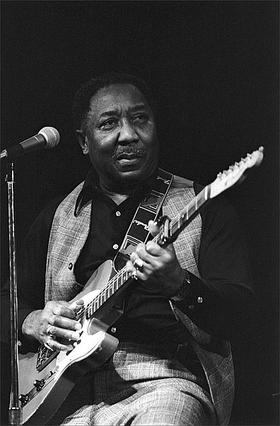Book Review: Early Mud

A feature of this year’s Chicago Blues Festival will be a night of musical tribute in Grant Park to Muddy Waters and Willie Dixon, two great Chicago bluesmen.
For background information on Muddy I refer you to the biography written by Robert Gordon, Can’t Be Satisfied: The Life and Times of Muddy Waters. Muddy’s life is a fantastic tale of adaptation to changing life conditions. Below is an introduction.
In 1942 Alan Lomax, a folk blues historian representing the Library of Congress, and Lewis Jones of the Fisk University sociology department arrived at the Stovall Plantation to interview and conduct field work with Muddy Waters, age 28, and his sharecropping family. Muddy displayed his skill on the guitar backed by members of the Son Sims band.
A 78 rpm record, Muddy’s first recording, was produced on this date and is pictured here with a proud Muddy Waters (born McKinley Morganfield). The record was made with high-grade ribbon microphones and a 200 pound “portable” disk recorder positioned at the plantation commissary. A sampling of Muddy’s song-playing repertoire listed by Lomax in his field journals includes the traditional tunes “You Are My Sunshine,” “Country Blues,” and “I Be’s Troubled;” also on this list are “Thirteen Highway” (Walter Davis), “Sugar Mama” (Sonny Boy Williamson), and “Canary Bird Blues” (McKinley Morganfield). Lomax and Jones documented Muddy’s record collection as including work by Arthur Crudup, Peetie Wheatstraw, and Jay McShann.
Muddy learned guitar by being shown; there were no music books or sheets, and his education of poor quality may have lasted through the third grade. The child Muddy worked in the fields fetching water; when a bit older he was handed a bag and told to pick cotton. He later drove a mule or tractor.
In Mississippi, Muddy played at house parties or juke joints. He always had his eyes on Chicago, where others had gone. Gordon writes that in the early 1940s there were more migrant Mississippians in Chicago than in Mississippi. When Muddy arrived there were friends or relatives for him to stay with. Stepping off the Illinois Central train very close to the Loop, Muddy did not go far—he lived on the near west and south sides of the City. Muddy worked in factories and as a truck driver to support himself.
Muddy listed his acoustic guitar influences as Delta musicians Charley Patton, Son House, and Robert Johnson. The slow-tempo, quiet country blues style of Muddy’s soon came under the influence of West Side musician neighbors; and, the noise in the small clubs made his acoustic style impractical.
Big Bill Broonzy was the blues leader in the city and gave advice and encouragement. Jimmy Rogers, another Delta migrant in Chicago, was the second guitarist and harmonicist in Muddy’s first group. Blue Smitty had a briefer involvement, but was notable for advancing Muddy’s individual note fret-playing at a time when he was playing bottleneck slide guitar.
Not employing a bass player, the guitar players loosened their strings for a deeper, rhythmic sound. Smitty also showed Muddy how to boost his sound by installing an amplification unit in the guitar hole and plugging in—city electric blues became raucous and blues rock a step closer.
Guitarist Jimmy Rogers, living just off Maxwell Street (an eight-block flea market), found Little Walter (Jacobs) playing on the street one Saturday morning. He knew Walter and his powerful mouth harp sound from Arkansas, sought him out and took him eight blocks west to Muddy’s house.
The three started working together with drummer Big Face Leroy and got a weekend gig lasting eight years at the Zanzibar Club at Thirteenth and Ashland—a narrow space with a long bar on one wall and booths on the opposite wall, band in the back. They became known by dropping in other bars during the week, asking for a little space and time and playing for free, all the while announcing/promoting their paying weekend gig at the Zanzibar.
Eventually, Aristocrat Records (precursor to Chess) on South Michigan Avenue called and a lengthy recording career began
Reference. Gordon, Robert. Can’t Be Satisfied: The Life and Times of Muddy Waters. Little, Brown and Company: New York. 2002. Gordon’s book is a savoring of blues history—a true guide to Delta blues and Chicago blues. I read the First Back Bay trade paperback edition, published in June 2003. Included are 70-plus pages of detailed notes, lengthy bibliography and index, 284 pages of text, and three appendices.
9(MDA3NDU1Nzc2MDEzMDUxMzY3MzAwNWEzYQ004))
Become a Member
Join the growing family of people who believe that music is essential to our community. Your donation supports the work we do, the programs you count on, and the events you enjoy.
Download the App
Download KUVO's FREE app today! The KUVO Public Radio App allows you to take KUVO's music and news with you anywhere, anytime!